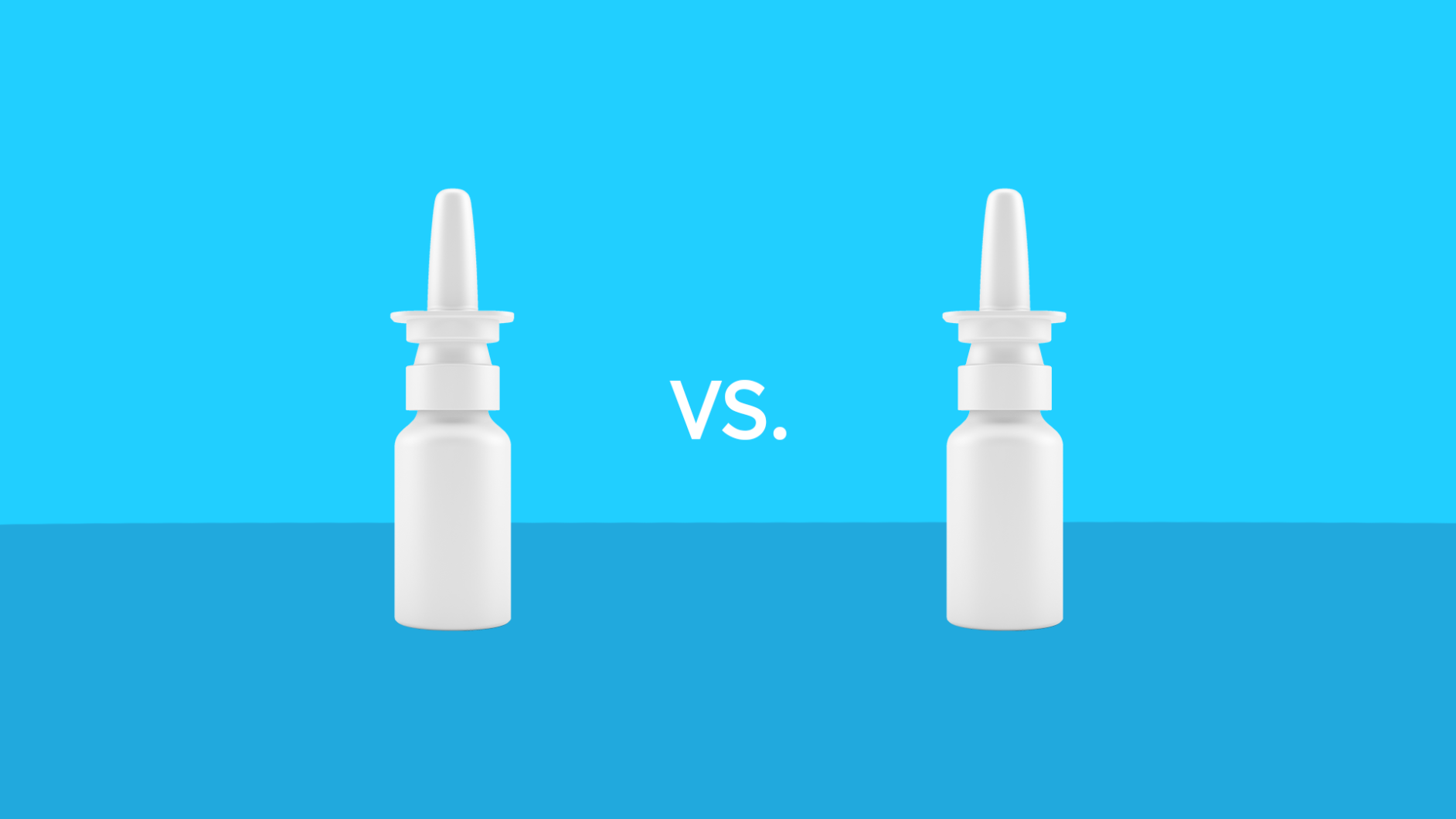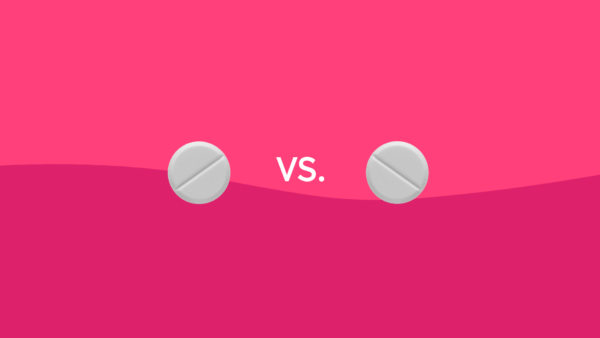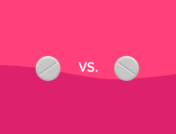Drug overview & main differences | Conditions treated | Efficacy | Insurance coverage and cost comparison | Side effects | Drug interactions | Warnings | FAQ
Do you suffer from a stuffy or runny nose, sneezing, and itchy, watery eyes? If so, you may be one of the 50 million Americans who suffer from allergies each year. Flonase (fluticasone) and Nasonex (mometasone) are two FDA-approved nasal spray medications used for the treatment of nasal allergy symptoms. They are known as glucocorticoids, or more commonly known as steroids. They work by decreasing inflammation and congestion in the nasal passages, thus relieving allergy symptoms. Both medications are known as nasal steroids, but Flonase and Nasonex do have some notable differences, which we will outline below.
What are the main differences between Flonase and Nasonex?
Flonase (fluticasone) is a nasal corticosteroid, or more commonly referred to as a nasal steroid. It is available by prescription in its generic form, as well as over-the-counter (OTC) in brand and generic. The OTC brand-name product is called Flonase Allergy Relief spray and is available in an adult formulation as well as a children’s formulation. It is also available in a gentle mist spray, called Flonase Sensimist, in both an adult and children’s formulation. Flonase can be used in adults and children 4 years and older.
Nasonex (mometasone) is also a nasal steroid. It is available in brand and generic, by prescription only. It can be used in adults, as well as children ages 2 years and older.
| Main differences between Flonase and Nasonex | ||
|---|---|---|
| Flonase | Nasonex | |
| Drug class | Nasal corticosteroid | Nasal corticosteroid |
| Brand/generic status | OTC: Brand and generic Rx: Generic |
Rx: Brand and generic |
| What is the generic name? | Fluticasone propionate | Mometasone furoate |
| What form(s) does the drug come in? | OTC: Flonase Allergy Relief nasal spray (adults and children)
Flonase Sensimist nasal spray (adults and children) Rx: Generic fluticasone |
Nasal spray |
| What is the standard dosage? | Adults: 2 sprays (50 mcg per spray) in each nostril daily or 1 spray in each nostril twice dailyAdolescents and children 4 years and older: 1 spray in each nostril daily (may temporarily increase to 2 sprays in each nostril per day, and decrease again once symptoms are controlled) |
Adults: 2 sprays (50 mcg per spray) in each nostril once daily
Children ages 2 to 11: |
| How long is the typical treatment? | Short-term or long-term (depending on symptoms and doctor’s instruction)
*consult with doctor if your child needs treatment for more than 2 months a year |
Short-term or long-term (depending on symptoms and doctor’s instruction)
*consult with doctor if your child needs treatment for more than 2 months a year |
| Who typically uses the medication? | Adults, adolescents, children age 4 years and older | Adults, adolescents, children age 2 years and older |
Conditions treated by Flonase vs. Nasonex
Flonase is indicated for the management of the nasal symptoms of seasonal or perennial (year-round) nonallergic rhinitis (nasal inflammation) in adults and children 4 years and older. Nonallergic rhinitis is a condition where you experience nasal symptoms that resemble allergies or hay fever but the symptoms do not have a known cause. Flonase is also used off-label for several other conditions, outlined below.
Nasonex is used for the treatment of the nasal symptoms of seasonal and perennial allergic rhinitis in adults and children 2 years and older. It is also used to prevent seasonal allergies in adults and children 12 years and older, and to treat nasal polyps in adults and children 18 years and older. Nasonex also has some off-label uses, outlined below.
| Condition | Flonase | Nasonex |
| Management of nasal symptoms of seasonal or perennial nonallergic rhinitis | Yes (4 years and older) | Off-label |
| Treatment of the nasal symptoms of seasonal and perennial allergic rhinitis | Off-label | Yes, 2 years and older |
| Prophylaxis (prevention) of seasonal allergic rhinitis | Off-label | Yes, ages 12 years and older |
| Treatment of nasal polyps | Off-label | Yes, ages 18 years and older |
| Acute bacterial rhinosinusitis, adjunct to antibiotics | Off-label | Off-label |
| Viral rhinosinusitis symptom relief | Off-label | Off-label |
| Chronic rhinosinusitis | Off-label | Off-label |
Is Flonase or Nasonex more effective?
In a three-month study comparing Flonase to Nasonex in 459 patients (ages 12-77 years) for perennial rhinitis, both drugs were found to be similarly effective and well-tolerated.
Another, smaller eight-week study of 75 patients with allergic rhinitis came to the same conclusion: Flonase and Nasonex are similarly effective in treating allergy symptoms.
The most effective drug for you can only be determined by you and your doctor, who can take into account your medical conditions(s) and medical history, as well as other medications you take.
Coverage and cost comparison of Flonase vs. Nasonex
Flonase is generally covered by most insurances and Medicare Part D in its generic form, fluticasone. The various OTC versions of brand-name Flonase are generally not covered. Nasonex is usually covered by most insurance plans and Medicare Part D in its generic, mometasone. The brand-name of each drug may not be covered or may be covered at a higher copay.
You can get generic Flonase for around $11 and generic Nasonex for as low as $13.50 with a SingleCare coupon.
| Flonase | Nasonex | |
| Typically covered by insurance? | OTC: no Rx: yes |
Yes, generic |
| Typically covered by Medicare Part D? | OTC: no Rx: yes |
Yes, generic |
| Standard dosage | 1 unit | 1 unit |
| Typical Medicare Part D copay | $0-$20 | $15-$145 |
| SingleCare cost | $11-$29 | $13.50+ |
Common side effects of Flonase and Nasonex
Both Flonase and Nasonex are well tolerated by patients. The most common symptoms of both drugs are headache, asthma symptoms, nausea/vomiting, and cough. Other side effects listed for both drugs occurred at a similar frequency as placebo (inactive medication), such as nosebleeds and sore throat.
Other side effects may occur. Consult your healthcare provider for a full list of side effects.
| Flonase | Nasonex | |||
| Side effect | Applicable? | Frequency | Applicable? | Frequency |
| Headache | Yes | 6.6%–16.1% | Yes | 26% |
| Nausea/vomiting | Yes | 2.6%–4.8% | Yes | 2-5% |
| Cough | Yes | 3.6%–3.8% | Yes | 7% |
| Asthma symptoms | Yes | 3.3%–7.2% | Yes | 2-5% |
Source: DailyMed (Flonase), DailyMed (Nasonex)
Drug interactions of Flonase and Nasonex
Flonase and Nasonex are both processed, or metabolized, by an enzyme called cytochrome-P 450 3A4, otherwise known as CYP3A4. This enzyme is involved in the metabolism of many drugs. Certain drugs can inhibit this enzyme, and slow the enzyme down from processing Flonase or Nasonex, which can lead to a buildup of the nasal steroid and cause increased steroid side effects. Therefore, strong CYP3A4 inhibitors should generally not be taken in combination with Flonase or Nasonex, because together they would cause increased side effects of Flonase or Nasonex.
Other interactions may be possible. Check with your healthcare provider for medical advice.
| Drug | Drug Class | Flonase | Nasonex |
| Atazanavir Clarithromycin Conivaptan Indinavir Itraconazole Ketoconazole Lopinavir Nefazodone Nelfinavir Ritonavir Saquinavir Voriconazole |
Strong CYP3A4 inhibitors | Yes | Yes |
Warnings of Flonase and Nasonex
- Localized effects may occur from nasal steroids, including nosebleeds, nasal ulceration, local Candida (yeast) infection, nasal septal perforation, and impaired wound healing.
- Nasal steroids may cause glaucoma or cataracts. If you have any changes in vision, or if you have a history of increased intraocular pressure, glaucoma, and/or cataracts, then you should be closely monitored by an ophthalmologist. Also, if you use Flonase or Nasonex for a long time or have any eye symptoms, you should regularly consult an ophthalmologist.
- If a hypersensitivity reaction occurs (symptoms may include rash, shortness of breath, swelling of the face or tongue), stop using Flonase or Nasonex immediately, and seek emergency medical attention.
- Steroids suppress the immune system, so you are more prone to infections while using a steroid nasal spray.
- In children, growth should be closely monitored because steroids can cause a reduction in growth velocity. The lowest dose, for the shortest duration of time, should be used.
- Adrenal suppression is a rare condition that may occur. If this occurs, the nasal steroid should be slowly tapered to discontinuation (steroids should never be stopped abruptly).
- There is not enough data about the use of nasal steroids in pregnancy, therefore, you should consult with your doctor before taking Flonase or Nasonex if you are pregnant. If you are already taking Flonase or Nasonex and find out that you are pregnant, contact your healthcare provider for guidance.
Frequently asked questions about Flonase vs. Nasonex
What is Flonase?
Flonase is a nasal steroid used to treat nasal allergy symptoms. It can be used in adults and children ages 4 years and older. It is available by prescription as well as OTC.
What is Nasonex?
Nasonex is a nasal steroid used to treat nasal allergy symptoms in adults and children ages 2 years and older. It can also be used to treat nasal polyps in patients 18 years and older, and to prevent allergy symptoms in patients 12 years and older. It is available by prescription only.
Are Flonase and Nasonex the same?
Flonase and Nasonex have many similarities. They are both nasal steroids that are used to treat the nasal symptoms of allergies. They also have several differences, such as in indications for use, availability, and price. Other nasal steroids you may have heard of include Nasacort (triamcinolone) and Rhinocort Allergy (budesonide), as well as Dymista which includes a nasal steroid (fluticasone) as well as an antihistamine (azelastine).
You can compare other allergy drugs on the following pages:
Is Flonase or Nasonex better?
Flonase or Nasonex seem to be equally effective in helping to improve nasal symptoms and are both well-tolerated. You can ask your doctor to help you decide which drug may be best for you—sometimes it takes a bit of trial and error to figure out which drug works best for you.
Can I use Flonase or Nasonex while pregnant?
It depends. Flonase or Nasonex may be safe to use in pregnancy, although there is not much data. Check with your OB-GYN for guidance.
Can I use Flonase or Nasonex with alcohol?
Flonase or Nasonex may be safer alternatives to traditional oral allergy medications if you want to have a drink or two. Check with your healthcare provider to be sure that alcohol is compatible with any medications you take, or any medical conditions you have.
What is the best time to take Flonase?
The time of day is not important. You can take your daily dose in the morning or evening. It is best to pick a time that you will consistently remember to take Flonase every day.
Is Flonase an antihistamine or decongestant?
Flonase is a nasal steroid, which helps relieve nasal inflammation and congestion.
Can you use Nasonex everyday?
Nasonex should be used every day when needed in order to work best. For example, if you usually have allergy symptoms from April to June, you may want to start using Nasonex two weeks before you generally experience symptoms and continue using it every day until the time when you no longer have allergy symptoms. If you have year-round symptoms, talk to your doctor about using Nasonex year-round.





